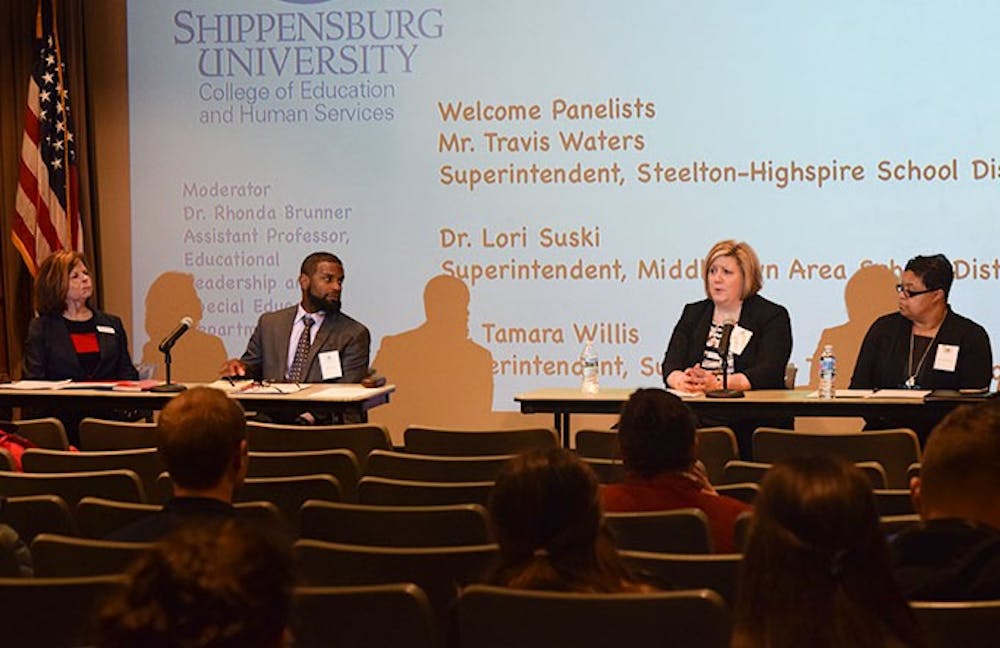Superintendents from three communities in Pennsylvania raised awareness about the issues of poverty in their school districts when they visited Shippensburg University Tuesday.
Travis Waters, Lori Suski and Tamara Willis spoke to students and staff as a panel about the problems their school districts face involving poverty and how they are handling it.
Waters is the superintendent of Steelton-Highspire School District, which has a 91 percent poverty rate.
“The borough of Steelton has the most concentrated poverty in the state of Pennsylvania,” Waters said.
It costs $13,000 for a student to attend Steelton-Highspire. The average cost in Pennsylvania is $16,000, according to Waters.
Students are enrolling in the Steelton-Highspire School District two to three years behind the normal age, and they must try and catch those students up with fewer resources. This year is the first time they have had a reading specialist in three to four years. Average districts have about three reading specialists per grade, Waters said.
Suski is the superintendent of Middletown Area School District. It has a poverty rate of 55 percent, and pays $15,000 per student at its district.
A lot of students in the district have spent time in homeless shelters. The district has hired two social workers, because many students have social and emotional difficulties, Suski said.
The school board is forced to help students in crisis because the parents choose to not have any contact with the schools.
Numerous students in Middletown are two to four grade levels behind.
They cannot have the test scores in the 90th percentile because a lot of students are not being fed at home, according to Suski.
Others may not have a place to sleep or could be experiencing abuse at home, according to Suski.
Willis is Susquehanna School District’s superintendent.
Historically, Susquehanna has had a low level of poverty.
It currently has a 48 percent poverty rate. Susquehanna tracks its students as they start kindergarten to determine their level of school readiness, according to Willis.
Some families in poverty move so frequently because they cannot afford rent. Susquehanna works with surrounding school districts to make sure students who are transferred can keep a steady flow in school. Susquehanna also brings in social workers for its students.
Currently all high school students in Susquehanna own laptops, and middle school students have access to laptops.
“By the year 2021, our goal is that all of our students will have access to a device,” Willis said.
The school board is also helping parents with access to technology. The board works with Comcast because it provides low-rate internet. Waters added that Steelton-Highspire School District also has certain access to technology.
“Our students are able to bring home Chrome Books,” Waters said.
Steelton-Highspire works with Comcast for low prices as well. Students in grades 7 to 12 are dual enrolled at Harrisburg University. A university professor comes to the district to teach technology to students.
In Middletown Area School District, students in grades six to 12 are provided an iPad.
Teachers can upload their course content onto a website called Canvas, which is a learning management system.
Waters clarified that it costs more to be in poverty than it does otherwise. Being evicted and not having a bank account are examples of that.
“Poverty tends to attract poverty,” said Waters.
Middletown’s school district offers food programs, and it began serving breakfast to students in 2006. In 2011, it started providing students with food in the summer, which is federally funded. The program is for everyone in the community. The district also has programs to provide students with food on the weekends.
“We are partnering with the Central Pennsylvania Food Bank,” Suski said.
Suski closed the panel with a story about a student who was handling a tough situation. A student was involved in an incident that ended with his arrest.
His parents kicked him out at 18, and he became homeless. He was determined to get an education, so he was put into cyber school and eventually met the qualifications to graduate.
After graduation, he came to Suski for help because he did not know how to get a job.
“That child is now 19. He lives with my husband and me. He is a student at Harrisburg Area Community College who carried 18 credits this year,” Suski said. “He works part-time at Giant Foods, 35 hours a week, is maintaining a 2.5 GPA, got off juvenile probation and is living a wonderful life because one caring adult believed in him. Don’t underestimate the impact that you have as an educator.”



The Slate welcomes thoughtful discussion on all of our stories, but please keep comments civil and on-topic. Read our full guidelines here.